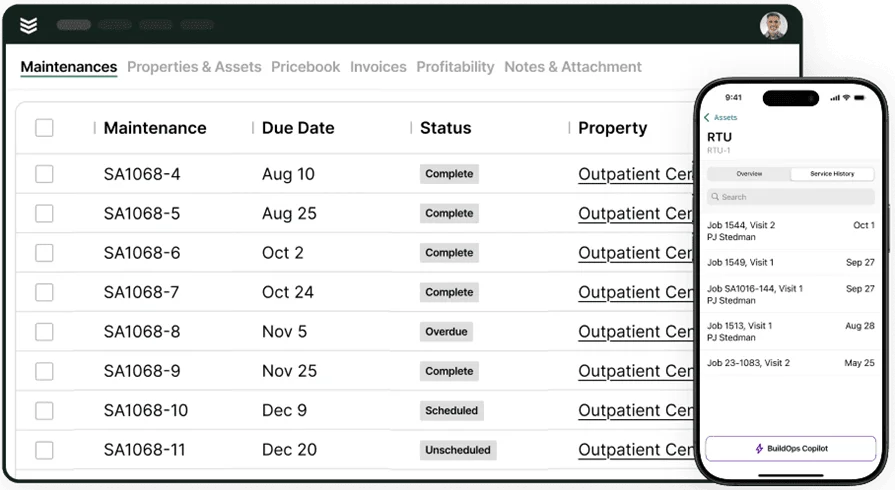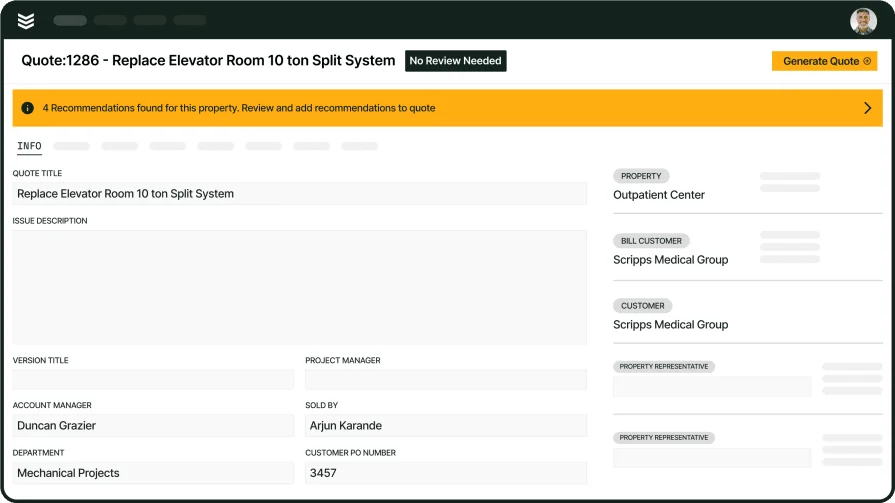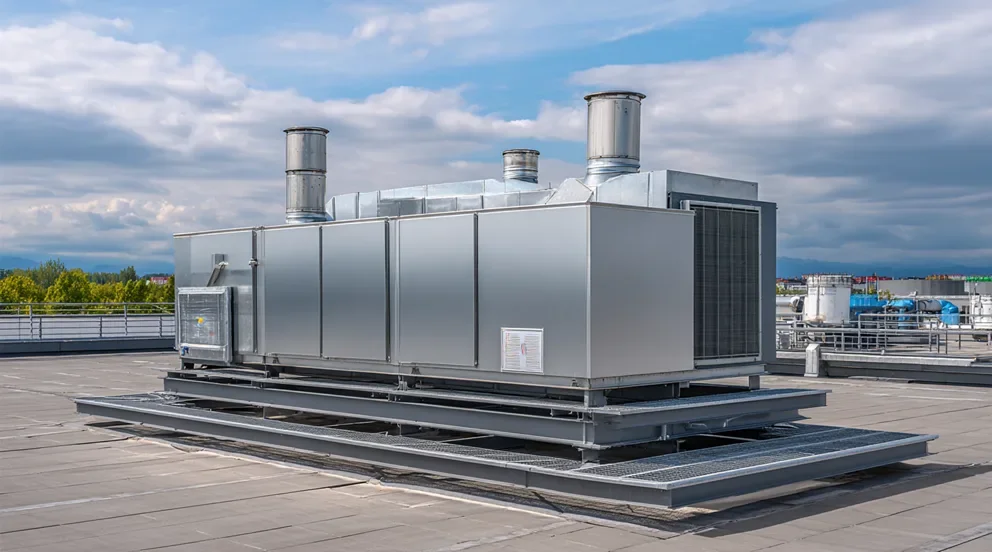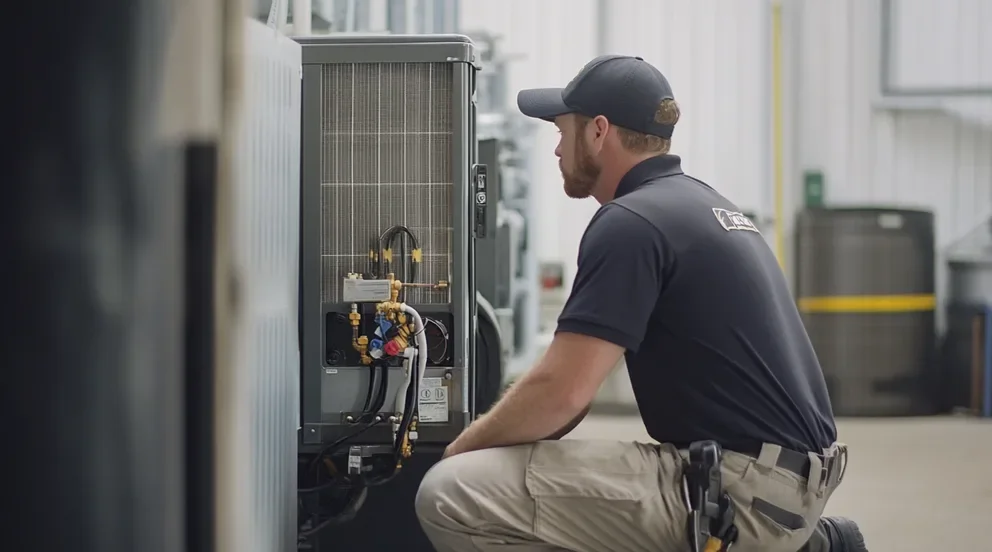Juggling service calls, dispatching techs, and keeping up with invoices can feel like a never-ending job. In a fast-moving industry like HVAC, the last thing you need is outdated systems slowing you down. Cloud-based HVAC software puts everything at your fingertips—scheduling, customer management, invoicing—so your business runs smoother, your team stays on track, and no job slips through the cracks.
In this guide, we’ll cover everything you need to know, including:
- How to choose a cloud-based HVAC software
- 7 key features to look for in a cloud-based HVAC software
- 6 best cloud-based HVAC software
- 7 benefits of using a cloud-based HVAC software
- 4 important cloud-based HVAC software FAQs answered
Finding the right cloud-based HVAC software starts with asking the right questions. Not all platforms are built the same, and what works for one shop might not be the best fit for another. Let’s look at the key things to consider when choosing a system that keeps your team running at full speed.
How to choose a cloud-based HVAC software
The best cloud platforms keep your team connected in real-time, eliminate scheduling headaches, and give you instant access to job details from anywhere. No more getting stuck in the office or flipping through paperwork—everything runs from a single, accessible system. But not all cloud-based solutions are built the same, so before committing, HVAC businesses need to ask the right questions.
- Scalability – Can this cloud software handle more jobs, techs, and locations as your business grows? Does it adjust to seasonal demand without slowing down?
- Accessibility – Can your team access schedules, customer history, and job updates from any device, anywhere? How well does the mobile app work in the field?
- Integration – Does it sync with your accounting, inventory, and GPS tracking software? Or will you be stuck manually transferring data between systems?
- Support & reliability – Is the cloud platform secure and reliable? What happens if there’s downtime—does it have strong customer support to back you up?
- Features – Does it include cloud-based essentials like real-time dispatching, automated invoicing, and live job tracking? Can technicians update work orders from their phones?
Cloud-based HVAC software gives you flexibility and real-time control, but how does it compare to other types of HVAC management systems? Let’s break down the key differences so you can see why cloud solutions stand out.
What makes cloud-based HVAC software unique from other types?
Not all HVAC software works the same way. Some systems are locked to a single office computer, while others require constant manual updates. Understanding the different types of HVAC software helps you choose the best fit for your business.
- Cloud-based: Runs entirely online, so you can access schedules, work orders, and customer data from anywhere. Updates happen automatically, and your team stays connected in real-time—perfect for managing techs in the field without the hassle of manual syncing.
- Web-based: Similar to cloud-based but may require local installations or manual updates. While accessible through a browser, it might not offer full mobile functionality or real-time syncing like a true cloud platform.
- On-premise: Installed on local computers and servers, meaning you can only access it from the office. This setup can be more secure for some businesses but lacks the flexibility of cloud-based solutions and often requires IT maintenance.
- Hybrid: A mix of cloud and on-premise, allowing some data to be stored locally while still offering online access to certain features. This setup can work for companies with specific security concerns but often requires extra configuration and maintenance.
Cloud-based HVAC software stands out because of its flexibility, real-time access, and ease of use. Whether your team is in the office or out in the field, everyone stays on the same page without the need for constant manual updates or IT support.
Knowing the type of software you need is one thing—finding the right features is another. Let’s break down the key features that make a cloud-based HVAC software truly valuable for your business.
7 key features to look for in a cloud-based HVAC software
The right cloud-based HVAC software takes the guesswork out of the day-to-day, letting you handle everything in one place without drowning in paperwork. Below are seven key features that make a real difference for HVAC contractors, service techs, and business owners.
1. Intelligent scheduling & dispatching
Keeping track of job assignments manually leads to mistakes, missed calls, and inefficiencies. With HVAC scheduling software, dispatchers can assign jobs based on real-time availability, location, and skillset—ensuring the right tech gets to the right job without delays. For example, a service tech wrapping up a furnace repair shouldn’t have to call into the office to ask what’s next. With an automated system, their next job is assigned instantly, factoring in location and priority. No wasted time, no extra miles.
2. Technician mobile access
A cloud-based mobile HVAC field service app lets techs access job details, update work orders, and capture signatures from the field—without having to check in at the office. For instance, a tech is on-site for an AC installation and realizes the customer needs an additional part. Instead of making calls or waiting for approval, they update the job on their mobile app, notify the dispatcher, and get the part scheduled immediately.
3. Real-time fleet tracking
Knowing where your vehicles are at all times prevents unnecessary fuel costs and helps optimize job assignments. Cloud-based HVAC fleet tracking software allows dispatchers to reroute techs on the go based on location and job urgency. If by any chance, an emergency repair request comes in, you don’t have to guess which tech is closest. You can track every vehicle in real-time and send the nearest one, cutting response times and keeping customers happy.
4. Streamlined invoicing & payments
Paper invoices slow down cash flow and create extra work for office staff. With HVAC invoicing software, completed jobs automatically trigger invoices that can be sent to customers immediately—no delays, no forgotten charges. Take, for example, a tech who just finished a maintenance call, but the customer wants to pay on the spot. Instead of writing an invoice by hand, they generate it from their mobile device and take payment instantly through their field tech payments app.
5. Automated service agreements
Managing recurring maintenance contracts manually is time-consuming. Cloud-based HVAC service agreement software automates scheduling, reminders, and billing, so no contract ever falls through the cracks. For HVAC businesses offering seasonal tune-ups, missing a scheduled service means missing revenue. With automated agreements, customers get reminders, and techs get scheduled without lifting a finger.
6. CRM for HVAC businesses
Keeping track of customer history, job notes, and follow-ups is critical for repeat business. A cloud-based HVAC CRM software organizes everything in one place, so techs and office staff always have full visibility. Just imagine when a longtime customer calls about a noisy furnace. Instead of starting from scratch, the tech pulls up past service records and sees that a part was replaced last year—saving time and improving service.
7. Advanced reporting & analytics
Tracking job performance, revenue trends, and technician efficiency helps HVAC businesses make smarter decisions. Cloud-based HVAC reporting tools turn raw data into actionable insights. If your business is seeing more emergency calls in winter, reports help you analyze patterns and adjust staffing accordingly. Knowing what’s working (and what’s not) helps you plan ahead.
Other notable features to have in a cloud-based HVAC software
The best cloud-based HVAC software goes beyond just scheduling and dispatching. It should handle everything from job tracking to customer management, making life easier for both technicians in the field and office staff behind the scenes. These additional features help HVAC businesses stay organized, reduce manual work, and improve service quality—without adding complexity to their operations.
- Time tracking for technicians - Keeping tabs on billable hours and labor costs is critical for HVAC businesses. With cloud-based time tracking software, techs can clock in and out, log hours per job, and track overtime—all from their mobile devices. Imagine a tech finishing a repair late in the evening. Instead of filling out a paper timesheet or calling the office, they log their hours on the app, ensuring accurate payroll without the extra hassle.
- Digital quotes & estimates - Manually preparing quotes wastes time and increases the risk of errors. With cloud-based quoting software, HVAC businesses can generate detailed, professional estimates in minutes and send them to customers instantly. A contractor assessing a rooftop unit replacement doesn’t have to jot down numbers and calculate costs manually. Instead, they input job details into the software, which pulls pricing and labor costs automatically, creating a ready-to-send quote on the spot. See how HVAC quoting software makes estimating faster and more accurate.
- Customer pipeline management - Tracking leads, follow-ups, and ongoing jobs is easier with a cloud-based HVAC pipeline management tool that keeps everything in one place. An HVAC business bidding on multiple commercial contracts can monitor every lead in a single dashboard, ensuring no opportunities slip through the cracks. Automated follow-ups mean customers stay engaged without office staff manually tracking each one. Explore how HVAC pipeline management software keeps jobs and leads moving.
6 best cloud-based HVAC software & tools
The right cloud-based HVAC software keeps your business running smoothly, whether you’re scheduling jobs, dispatching techs, or managing invoices. With so many tools available, finding the best fit for your operation can be challenging. Below are six top-rated solutions designed to improve efficiency, scalability, and service delivery for HVAC businesses.
1. Best for commercial: BuildOps
BuildOps is built specifically for commercial HVAC businesses, offering an all-in-one platform that streamlines scheduling, dispatching, invoicing, and customer management. It’s designed to handle the complexity of large-scale projects, multi-location service contracts, and high-volume work orders. Unlike generic HVAC platforms, BuildOps provides deep integrations with accounting software, advanced reporting tools, and real-time field communication to keep teams connected.
How Pricing Works: We offer custom pricing based on company needs. You can also join a weekly live demo or request one anytime at your convenience to learn more.
Why Cloud-Based is Better: Commercial HVAC businesses rely on flexibility and scalability. A cloud-based system ensures teams can access job details, submit updates, and manage workflows from anywhere—critical for multi-site service operations.
What Sets it Apart for Commercial: BuildOps specializes in large-scale commercial work, offering features like automated service agreements, multi-location job tracking, and advanced asset management. No more paperwork delays—everything is handled in real-time.

See BuildOps in action
See how HVAC field techs are able to maximize productivity and profits.
2. Best cloud-based HVAC software for residential: OctopusPro
Image Source: OctopusPro
OctopusPro is tailored for residential HVAC service businesses, focusing on ease of scheduling, invoicing, and customer relationship management. It offers online booking, automated reminders, and payment processing—all useful for residential techs handling frequent service calls. Albeit, teams needing commercial-grade job tracking, multi-location support, or integration with enterprise accounting tools may find OctopusPro limiting. If your company serves both residential and commercial clients, a more scalable solution may be a better fit.
How Pricing Works: Pricing varies based on the number of users, starting at a basic monthly fee per technician.
Why Cloud-Based is Better: Residential HVAC businesses handle a high volume of service calls daily. A cloud-based system ensures customers receive timely appointment updates and techs have instant access to job details on the go.
What Sets it Apart for Residential: OctopusPro simplifies customer communication with automated SMS and email notifications, making appointment scheduling and follow-ups effortless.
3. Best cloud-based HVAC software for general contractors: FieldPulse
Image Source: FieldPulse
FieldPulse is a flexible field service management platform designed for contractors who handle HVAC along with plumbing, electrical, and other trades. It includes scheduling, invoicing, customer management, and team collaboration tools. While it works well for multi-trade businesses, HVAC-specific features like advanced dispatching and equipment tracking are not as robust as those found in HVAC-dedicated software. Teams needing deep HVAC integrations or large-scale commercial capabilities may require a more specialized platform.
How Pricing Works: FieldPulse offers a tiered pricing model based on the number of users, with add-ons for additional features.
Why Cloud-Based is Better: General contractors often manage multiple trades and job sites at once. A cloud-based platform ensures seamless coordination across projects, preventing scheduling conflicts and missed service requests.
What Sets it Apart for General Contractors: FieldPulse offers project tracking and job costing tools that help contractors manage multi-phase jobs with ease.
4. Service Fusion
Image Source: Service Fusion
Service Fusion is a cloud-based field service management platform designed for small to mid-sized service businesses. It offers scheduling, invoicing, and customer management tools, making it a decent option for HVAC contractors looking to digitize their workflows. However, companies handling large-scale commercial HVAC projects may find Service Fusion’s reporting and dispatching tools less comprehensive. Businesses needing advanced service agreements, predictive maintenance tracking, or multi-location job management may prefer a more HVAC-focused platform.
How Pricing Works: Service Fusion follows a subscription-based pricing model with different tiers based on feature access and user count.
Why Cloud-Based is Better: HVAC contractors using cloud-based platforms like Service Fusion can manage jobs remotely, send invoices instantly, and track technician progress without being tied to a physical office.
What Sets it Apart: Service Fusion includes built-in VoIP calling, allowing businesses to communicate with customers directly through the platform—reducing missed calls and improving response times.
5. Housecall Pro
Image Source: Housecall Pro
Housecall Pro is a popular all-in-one field service management tool with strong scheduling, invoicing, and customer communication features. It’s widely used by small to mid-sized residential HVAC businesses looking for an easy-to-use cloud solution. Though, teams needing customizable reporting, commercial-grade asset tracking, or more advanced technician dispatching may find Housecall Pro too simplified. Businesses handling complex service contracts may require a solution built specifically for HVAC operations.
How Pricing Works: Housecall Pro offers monthly subscription plans with different pricing tiers based on the number of users and access to advanced features.
Why Cloud-Based is Better: A cloud-based system allows residential HVAC businesses to automate customer reminders, accept payments online, and update work orders from any location.
What Sets it Apart: Housecall Pro includes automated marketing features, helping HVAC businesses stay in touch with customers through follow-up emails and service reminders.
6. FieldEdge
Image Source: FieldEdge
FieldEdge is a field service management tool built with trade businesses in mind, including HVAC, plumbing, and electrical contractors. It offers dispatching, invoicing, and customer tracking, along with integrations for QuickBooks accounting. While FieldEdge provides a good general service management solution, HVAC teams requiring real-time equipment tracking, multi-location scheduling, or AI-powered dispatching may find it lacking compared to more specialized platforms.
How Pricing Works: FieldEdge offers a quote-based pricing model depending on the size and needs of the HVAC business.
Why Cloud-Based is Better: FieldEdge allows HVAC businesses to access customer history, job details, and invoicing remotely—ensuring techs and office staff stay connected in real time.
What Sets it Apart: FieldEdge’s built-in QuickBooks integration helps businesses sync invoices, payments, and accounting records seamlessly.

Key AI insights from top contractors
80% of contractors say AI will be essential to be competitive in 3 years. Don’t fall behind.
7 benefits of using a cloud-based HVAC software
For HVAC contractors, service techs, and business owners, time is money. Running operations with outdated methods—manual scheduling, paper invoices, and disconnected communication—leads to wasted hours and lost revenue. Cloud-based HVAC software eliminates these headaches by keeping everything in one place, accessible from anywhere. It helps teams stay organized, improve efficiency, and provide better service to customers. Here’s how switching to the cloud makes a real impact on day-to-day HVAC operations.
1. Instant access to job information
With cloud-based software, technicians and office staff can pull up job details, customer history, and service notes from anywhere. No more flipping through paper files or calling the office for updates. Imagine a tech arriving at a job site only to realize they need details about a past repair. Instead of delaying the job, they check the cloud system, access the full work history, and get right to work.
See how the top HVAC service software can streamline your business.
2. Faster scheduling and dispatching
Manual scheduling leads to double bookings, missed appointments, and techs spending more time driving than working. A cloud-based system automates scheduling and assigns jobs based on real-time availability and location. If a situation calls for when a dispatcher juggles multiple emergency service calls, having instant access to technician locations ensures the nearest available tech gets assigned, cutting down response time.
Learn more about how to choose the right HVAC scheduling software and how it keeps operations running smoothly.
3. Seamless customer management
Building long-term relationships with customers means keeping track of their service history, upcoming maintenance, and past interactions. A cloud-based HVAC CRM software organizes all this in one place. For instance, when a loyal customer calls about their AC making noise, the office staff quickly pulls up their records, sees past service notes, and schedules a follow-up—improving both service speed and customer satisfaction.
Find out how HVAC CRM software helps maintain better customer relationships.
4. Faster invoicing and payments
Paper invoices slow down cash flow, create administrative backlogs, and increase the chances of errors. Cloud-based HVAC invoicing software lets businesses send invoices immediately after a job is completed. Think of it this way, instead of waiting until the end of the day to process paperwork, a tech can finalize the job, generate an invoice on their mobile device, and send it to the customer instantly—it just speeds up payments.
Explore more about HVAC invoicing software’s benefits that help businesses get paid faster.
5. More accurate estimates and proposals
Winning jobs depends on sending accurate, professional estimates quickly. A cloud-based HVAC proposal software allows contractors to create and send detailed quotes without the usual back-and-forth. If, for example, a contractor is on-site inspecting a new HVAC system installation, they can build a proposal on the spot, include labor and parts costs, and send it to the client before even leaving. See how HVAC proposal software speeds up the bidding process.
6. Better financial tracking and reporting
A cloud-based system helps HVAC businesses track revenue, monitor job profitability, and avoid billing errors. Instead of manually piecing together spreadsheets, automated HVAC billing software provides real-time financial insights. Think of this situation where a business owner reviewing monthly revenue can instantly see outstanding invoices, top-performing services, and areas where costs can be cut—all from a single dashboard.
7. Scales with your business growth
As HVAC businesses grow, they need software that can handle more jobs, more customers, and a larger team. Cloud-based HVAC software for small businesses ensures companies aren’t held back by outdated systems. Think of a small shop as an example, expanding to multiple locations won’t need to overhaul its software—cloud systems grow with them, offering the flexibility to add users, services, and features as needed. Check out HVAC software for small businesses that scale with demand.
4 important cloud-based HVAC software FAQs answered
With more HVAC businesses switching to cloud-based software, there are common questions about how it works, who needs it, and whether it’s worth the investment. Here’s a breakdown of the most frequently asked questions HVAC professionals have about cloud-based HVAC software.
1. What is cloud-based HVAC software?
Cloud-based HVAC software is a platform that helps businesses manage scheduling, dispatching, invoicing, and customer data from anywhere. Hosted online, it removes the need for on-premise servers, allowing real-time access to job details, payments, and reporting from any device with internet access.
Unlike traditional software that requires manual updates and local installations, cloud-based HVAC solutions stay up to date automatically. This ensures teams in the field and office always have access to the latest tools and information.
2. How does cloud-based HVAC software work?
Cloud-based HVAC software operates through an online platform, connecting technicians, dispatchers, and office staff in real-time.
- Scheduling & dispatching: Assign jobs instantly based on availability and location.
- Mobile access: Techs update job status, invoices, and service notes from their phones.
- Customer management: Store work history, quotes, and payments in one place.
- Automated updates: No manual installations—software updates happen automatically.
This system keeps the entire HVAC operation running smoothly without the limitations of desktop-based software.
3. Who needs cloud-based HVAC software?
Cloud-based HVAC software benefits a wide range of professionals, including:
- HVAC contractors managing multiple jobs and technicians.
- Service techs needing instant access to job details and updates.
- Office staff handling scheduling, invoicing, and customer records.
- Business owners looking for real-time financial tracking and job analytics.
Whether running a small operation or a large-scale commercial HVAC business, cloud-based software improves efficiency at every level.
4. Is cloud-based HVAC software worth the cost?
Yes, cloud-based HVAC software saves businesses time and money by reducing admin work, preventing scheduling mistakes, and speeding up invoicing. It automates scheduling, invoicing, and reporting, helping businesses cut paperwork and improve efficiency. With real-time job tracking and faster payments, HVAC companies can boost cash flow while scaling operations without expensive IT infrastructure. For contractors looking to streamline workflows and increase profitability, cloud-based HVAC software is a smart investment.
The right cloud-based HVAC software does more than just digitize your workflow—it transforms how your business operates. From real-time scheduling to seamless invoicing, cloud platforms keep your entire team connected, whether they’re in the office or out in the field. While many tools offer bits and pieces of functionality, finding one that truly covers all aspects of HVAC operations can be a challenge.
BuildOps brings everything together—advanced scheduling, dispatching, invoicing, and customer management- for commercial contractors needing an all-in-one platform built specifically for field service operations—into a single, cloud-based system.

Explore our HVAC tools
See how we help HVAC contractors run a more efficient, profitable operation.








